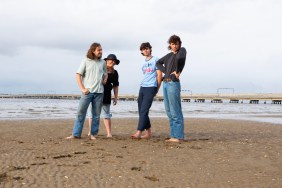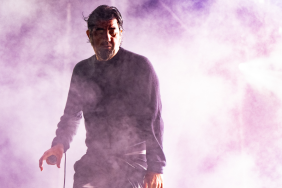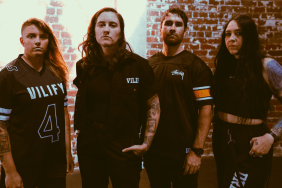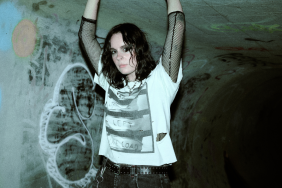Careening into popularity back in 2005 off the back of the stoner/psychedelic self-titled debut, Vancouver’s Black Mountain have grown both in terms of popularity and music over the past five years. Their latest album 2010’s Wilderness Heart showcases a less freaked out and more stripped back side to their sound, compared with their debut and sophomore album In The Future proving that the band, led by Stephen McBean, was more than just another whacked out group of stoners doomed to constantly cough up the same tired old album again and again.
Recorded at Sunset Sound in L.A. rather than at home like their previous two album, the recording also marking the first time the band have worked with producers, the album is altogether more concise. The songs, embracing more classic pop structures compared to the band’s more freewheeling work, reflect the band’s growing maturity in terms of songwriting, with McBean and co feeling less precious and more relaxed about the project.
Soon to visit our shores as part of the coming Playground Weekender festival, along with a run of select sideshows done the east coast, we caught up with McBean to discuss the new direction as well as where the band might be heading in the future.
Music Feeds: So your last album Wilderness Heart was less psychedelic or stoner influenced than the previous records, why is that?
Stephen McBean: I guess just the combination of the songs and the way we played them, when we were jamming, things just came out a bit shorter. It was all done live and that sort of just happened.
MF: So how does writing usually work in the band?
SM: Usually we have a song first and then we’ll work on it and see how everyone’s parts fit in. On this record we worked with Randall Dunn and Dave Sardy who were the producers on the record so there was a bit more work done before we went into the studio with them. We were sending them demos to see which songs they liked, so when we went into the studio we knew what songs we were going to work on. It was a good collaboration, but you know I’d never done that to that sort of extreme before. Certain things definitely came out of it that looking back were just obvious things to do that we might not have seen were it not for them. Stuff like adding parts to songs and that.
MF: So was it very different to how you’d normally work?
SM: It was very relaxed you know, just like hanging out with friends like we always do it but we just had more time to play rather than having to switch hats between playing and being an engineer you know.
MF: True I can imagine it gets hard to stay focussed on the music when you’re having to handle production duties as well?
SM: I mean I love recording, I have my own little studio and I love working on the technical aspect but sometimes I’ll be working on something by myself and I just wish someone would show up and tell me to stop.
But recording is such an odd experience. There’s no formula or anything, it can be a blues record done with one mic in a hotel room or some sprawling studio epic, but it either hits you emotionally or it doesn’t. It’s fun to battle with, to go down that road of ‘wait wait I’ve almost got it…’ but it’s just like ‘you’re never going to get it.’
MF: You spent most of the time working on this record at Sunset Sound in LA, what was that like?
SM: That place is great. When we came up with the idea that we wanted to work with a producer or whatever it became a matter of ‘who do you know?’ ‘Well that guys dead, Phil Spector is in jail,’ you know, but we had recorded one song before with Dave Sardy and we did it as Sunset Sound and we enjoyed that so we went with it again. But the studio is just a magical place. It’s got the history you know it’s got the 60s rock the 70s rock thing, it’s got the Walt Disney stuff from back in the 50s it’s got the Jim Morrison echo chamber which is… I mean when we were there the first time, you know we were tracking a song doing vocals live and the engineer asked do you want some reverb in your headphones and I’m like ok sure and this reverb just comes in and I’m like ‘what the hell is that, that’s gorgeous.’ I could’ve just sat there all day and made noises.
MF: Do you think that it affected the way the album came out in terms of songwriting?
SM: I don’t know, but its funny because a lot of people have said the new record sounds too modern but the all the gear we used is the oldest stuff we’ve ever worked with.
In terms of how it affected the songwriting though, obviously when you’re working in a studio like that time is money, as opposed to working at home, so it’s probably a more stripped down record than had we worked on it for a year at home, but I think it’s the same record we would’ve made, the home version would just have more bells and whistles without being any better. The producers had a great impact in that sense as they would be like ‘you don’t need that,’ or ‘that’s a good idea let’s work on that,’ rather than spending a day on something that wasn’t worth it.
It’s nice to disassemble your ego and all that that comes along with songs. When you first come up with a song you’re more precious of it than you would be six months down the road when you’re like I don’t even like that song. But I liked working this way because I can add it up to the list of things I’ve done in my life. I might not always do it that way and I might not ever have the chance to do it again so I was just like ‘yeah let’s go to LA and record,’ I mean what could be more preposterous for a bunch of Canadians. It was winter, the Olympics were on in Vancouver so we were just like let’s get out of here.
MF: Do you have any idea how you’re going to approach the next album, have you started writing any songs yet?
SM: I think it’s starting to percolate a bit on our minds, just ideas about where we might want to go, and I think over the next few months while we’re touring we’ll flesh out more ideas then. Every record I put out I get a bit more relaxed and less precious about it and am just happy to wait for something organic to just evolve.
For the next record, which will be our fourth we’ve got to do something, or else why would anyone care, you know, as opposed to repeating the first. There are certain songs on the first two records that we can play live endlessly, songs like Drugarnaut, or Stormy High and as long as the city’s changing people seem to be excited every night. You don’t want it get to the point where your fans are being like ‘oh no, they’re throwing in a new stinker.’
MF: Yeah I call that Billy Corgan syndrome.
SM: It’s kind of weird though how bands get to that point. Maybe it has something to do with them getting too big too fast cos there are all these bands like Nick Cave or Primal Scream where they’re constantly changing it up and the people who dig their music get really excited about that. Then you have artists like Bob Dylan who just keep going and then their fans just want to relive some sort of glory day of cocaine and strippers or something, I don’t know.
Black Mountain will be playing Playground Weekender on Thurs 17-20 February at Wisemans Ferry NSW, as well as a few sideshows including:
Brisbane
Thursday February 17
The Zoo
Sydney
Saturday February 19 & Sunday February 20
The Annandale
Melbourne
Monday February 21
The Corner Hotel












